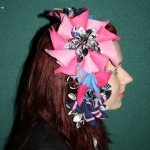Bronagh McKeown – Mathematics Teacher
On Saturday 14th September four members of the maths department attended ‘The Mathematical Association Secondary Education Mathematics Conference’ held in Stirling University (www.m-a.org.uk). The day consisted of a keynote address by Peter Ransom and then the opportunity to visit four different workshops of our own choice. Below is a summary of the workshops I attended:
Workshop 1
This workshop was entitled ‘A Square Meal’ by Adam McBride and it was both informative and entertaining (bonus!). The focus was on investigating Magic Squares (a square in which every row, column and diagonal have the same total). He showed lots of cool tricks that can be investigated by pupils and the algebra behind it all which could be investigated and discussed with high ability pupils. I found it very interesting and hope to be able to find a way to incorporate some of it into my lessons. Continue reading The Mathematical Association Secondary Education Mathematics Conference

















